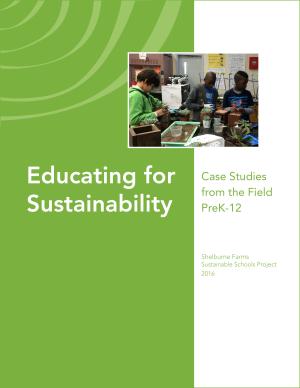Educating for Sustainability: Case Studies from the Field
Educating for a Sustainable Future is not just Shelburne Farms’ tagline. It’s an alternative -- you might say, radical -- view of the purpose of education. It’s a view explored in our new ebook, Educating for Sustainability: Case Studies from the Field, PreK-12.
This isn’t a book about pedagogical approaches, content, or the student outcomes of educating for sustainability (though all are critical). Instead, it sheds light on promising practices. From preschoolers mapping in a school garden to a middle school makerspace exploring social justice and food security, these nine case studies offer a compelling vision of what education can be: a pathway to create healthy and just communities, successful lives, and a more livable world.
Sustainability: When the environmental, economic, and social needs of a society are met in the present without compromising the ability of future generations to meet their needs.
But while there’s no strict definition of education for sustainability (EFS), unifying themes definitely emerge from these case studies.
EFS is learning in place. Students learn outside of classroom walls, on home turf. Their school grounds, neighborhoods, or towns become a campus to explore, so the curriculum content is clearly relevant to their lives. (We all tend to care more about things that are relevant to us.) Sometimes it might mean the community comes to them through visits to the classroom. In either case, the local becomes a microcosm for learning about larger systems.
EFS is learning about systems. Systems (one of the big ideas of sustainability), are parts that connect through larger patterns to form a more complex whole. When students can identify and deconstruct systems -- ecological, political, operational, or any kind -- they can start to see how tinkering with one part might affect the whole -- for better or worse. Systems thinking helps students target where problems start within a system, and where the greatest leverage points are for fixing them.
EFS is learning through service. How do you make a positive difference in the world? It starts by believing that you can. Then by knowing how. EFS empowers kids by giving them projects and opportunities in their communities to bring about real change. As they get older, active citizenship -- the sense not just that “I can” or “we can,” but that “we have to” -- scales up to tackle projects with potentially wider impact.
There’s certainly more to education for sustainability, but these ideas are a few of the building blocks. You’ll see them weave throughout all these case studies. And you’ll see something more. You’ll see the passion and dedication of some amazing educators who are determined to have empowered young citizens walk out their classroom doors at the end of the school year, ready to shape their world to be healthier and more just for everyone. In the process, these teachers are also helping to reshape education at large.
We hope this series of case studies will:
- inform educators, administrators, policy-makers, and families about the promise of EFS,
- inspire educators to transform their practice and classroom,
- engage a new generation of educators in EFS.
Please share these case studies widely!

